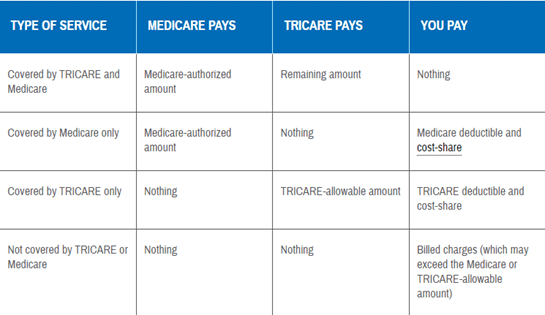Veteran’s Health Coverage and Medicare
Military personnel spend years of their lives dedicated to the service of protecting our nation. It is only right that they have access to great health care benefits while they are serving, but where do they go once their service is complete? Veterans, 65 and older or under 65 with certain disabilities, may be able to access both veteran’s health coverage and Medicare.
Type's of Veteran's Health Coverage
There are multiple health care coverage options for military veterans. If you are enrolled in one of these plans, you are considered covered by the ACA health care law. The most common military veteran coverage include:
- TRICARE For Life (TFL)
- Veteran Affairs Civilian Health and Medical Program (CHAMPVA)
- Veteran Affairs (VA) Health Benefits



How to Qualify for Veteran Coverage
TRICARE For Life
TRICARE for Life is available to military retirees who have served 20 or more years, and their spouses who are eligible for Tricare and are entitled to Medicare Part A and enrolled in Medicare Part B.
CHAMPVA
CHAMPVA is a health benefits program in which Veterans Affairs has a cost share for covered medical services and supplies for eligible beneficiaries. Beneficiaries may only be eligible for CHAMPVA if they do not qualify for TRICARE and one of the following descriptions is true:
- You are a veteran or dependent of a veteran who has been rated permanently and totally disabled for a service-connected disability by a VA office. A service-connected disability is one that was caused or made worse by the veteran’s active-duty service.
- You are the surviving spouse or child of a veteran who was rated permanently or totally disabled due to service-connected condition at the time of death.
- You are a surviving dependent of a veteran who died in the line of duty or dies from a service-connected disability.
If an individual is under 65 years old, he or she is eligible for CHAMPVA if they have Original Medicare Part A and Part B and are also eligible for CHAMPVA. If the person is 65 years or older, he or she is eligible for CHAMPVA if he or she is eligible for Medicare. One does not need to enroll in Medicare Part D to qualify for CHAMPVA.
Veteran Affairs Health Benefits
VA benefits are administered by the federal government. A veteran may be eligible for VA benefits depending on their existence of a service-connected disability, exposure related to service, and income. If one is eligible for VA benefits, he or she must apply through the U.S. Department of Veteran Affairs. One does not need to be enrolled in Medicare to receive care at a VA facility, however VA health coverage is not considered creditable medical coverage in regard to Original Medicare. Because of this, the VA does not recommend veterans cancelling or declining Medicare coverage solely because they are enrolled in VA health care. If the individual does not enroll in Medicare Part B when initially eligible, they may be subject to a penalty.
Who Pays the Bill?
TRICARE for Life
TRICARE for Life works similarly to a Medicare Supplement policy. When a TFL beneficiary seeks medical care, Medicare is primary, and Tricare is secondary. There is little to no out of pocket expenses for someone with TFL.

CHAMPVA
When enrolled in both Original Medicare and CHAMPVA, Medicare will be considered primary coverage and CHAMPVA secondary coverage. Medicare usually bills CHAMPVA automatically so the beneficiary should have little to no costs for medical services covered by both Medicare and CHAMPVA.
Veteran Affairs Health Benefits
For veterans that are eligible for VA benefits, it is important to understand that VA benefits do not work with Medicare, however one can be enrolled in both. VA benefits care for all military service-related disabilities at no cost and other medical care depends on which of the eight priority groups the VA assigns. If someone has both VA coverage and Medicare, it will depend on the plan they are enrolled, what type of facility they receive care at, and which benefits are designated to use in order to determine what Medicare will and will not cover.
If you would like to learn more on how your veteran coverage can pair with the different Medicare options available, click here.


